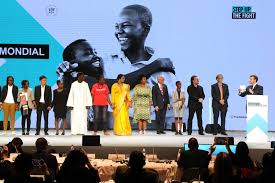Source: devex.com
I may be retired from the news business, but I still know a good story when I see one. Reports now tell us that more children than ever are growing up free of deadly diseases such as AIDS, tuberculosis, and malaria.
Just 20 years ago, a very different picture was being painted. AIDS was ravaging an entire generation; hundreds of thousands of children were dying before their 5th birthday simply due to a single bite from a malaria-infected mosquito; and TB spread like wildfire in many impoverished communities, leaving family members sick and unable to work.
My dear friend, the late former United Nations Secretary-General Kofi Annan called the fight against this loss of humanity “the greatest challenge of our generation” and quickly asked the United Nations Foundation, which I had recently launched at the time, to help be a part of the solution.
We joined with a range of partners to support the Global Fund to Fight AIDS, Tuberculosis and Malaria, which brings together governments, advocates, and experts to mobilize resources, coordinate efforts, and invest in innovative programs that are turning the tide against these three devastating diseases.
The work of the Global Fund has changed the landscape when it comes to AIDS, TB, and malaria: 18.9 million more people are now living long lives with HIV treatment and 131 million mosquito nets were distributed just last year to protect children around the world from the threat of malaria. Because of public and private sector partners uniting to take a stand, the Global Fund partnership has saved nearly 32 million lives and reduced the number of deaths caused by these three diseases by 40% in countries where the Global Fund invests its support.
Think about that: 32 million lives saved. That’s more than three times the population of the state of Georgia being given the opportunity to live healthy, productive lives all because people came together in partnership to fight, refusing a world where AIDS, TB, and malaria are allowed to destroy our communities.
This is a good news story so far — but how it ends is still to be determined. Right now, the progress we’ve made against these diseases is very fragile and, in some cases, such as with malaria, it’s stalled due to insufficient resources and lack of political will to carry on the fight.
It’s up to all of us to decide whether we protect the progress we’ve made and keep moving forward or become complacent and watch on as these diseases gain ground once again. If we lose progress on health, so much more around the world is at risk — from the stability of communities to the productivity of businesses.
We’re a mere 10 years out from the 2030 deadline to achieve a better future for people and our planet to which we committed under the Sustainable Development Goals – the world’s shared to-do list, adopted by nations worldwide four years ago. The success of the Global Fund’s efforts is linked to the success of these global goals — from ending poverty to achieving gender equality to ensuring health for all.
On Oct. 10 in Lyon, France, many countries and private sector partners stood up for progress, pledging more than $14 billion for the Global Fund’s work over the next three years. While these pledges are very important, they are not enough. All of us, especially engaged citizens like you and me, need to keep raising our voices to make sure that the fight against AIDS, TB, and malaria remains a priority on the global agenda.
We need others to step up the fight and contribute to achieving the world that my friend Kofi envisioned. We need more compassion, more engagement and most importantly, more collective action than we currently see in our often-fractured world. I call on private sector partners, country governments, and global citizens to help us all deliver on our promise for a better world.
